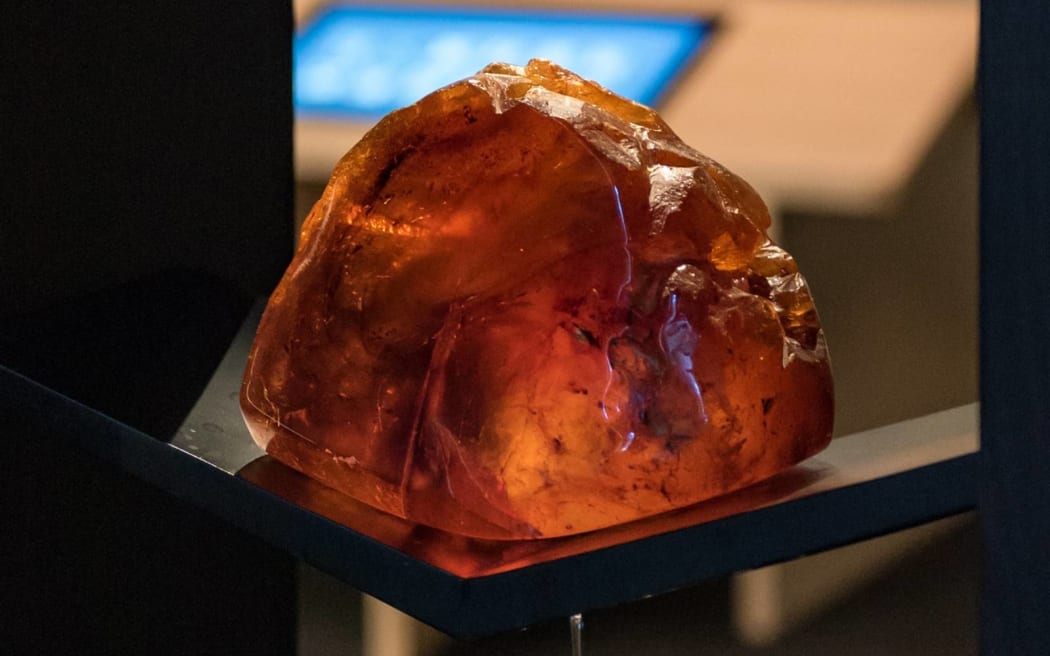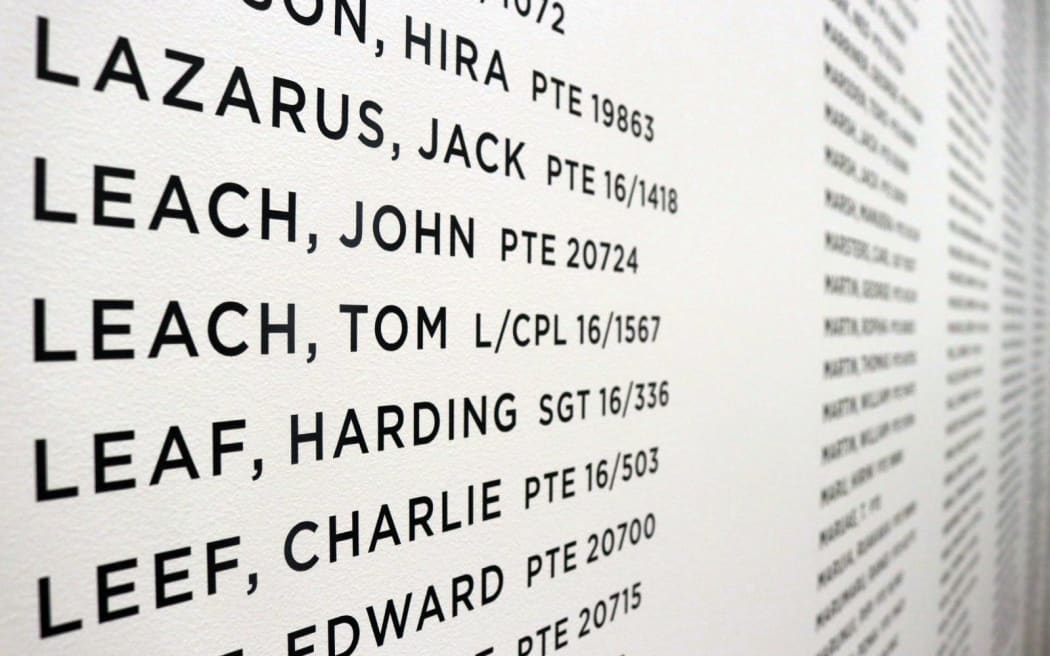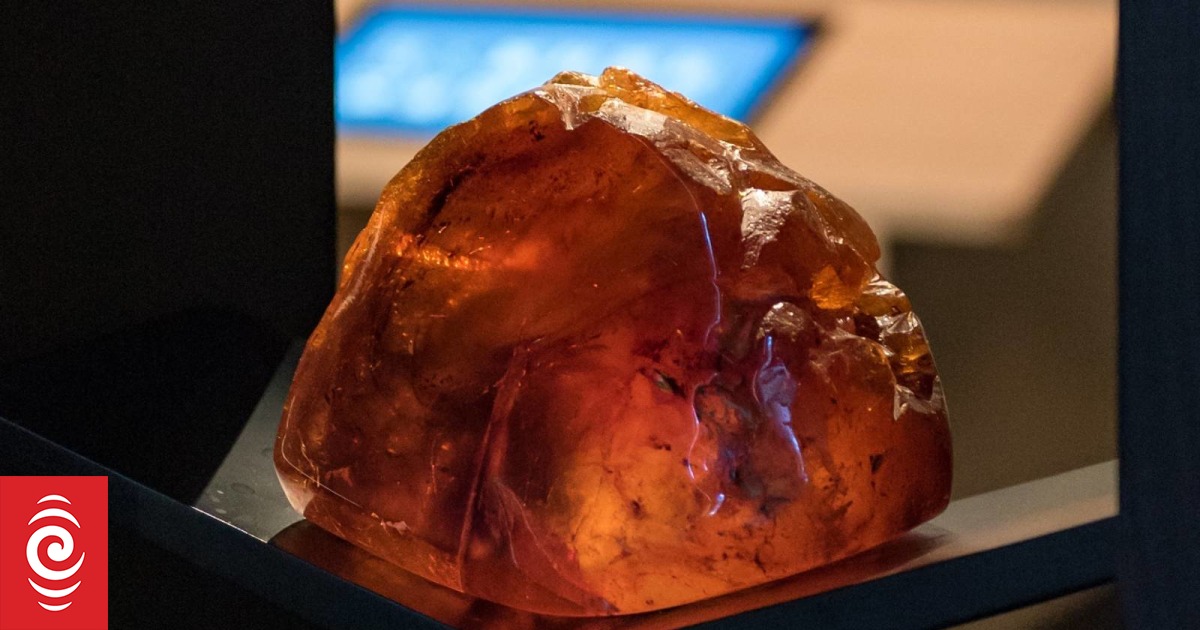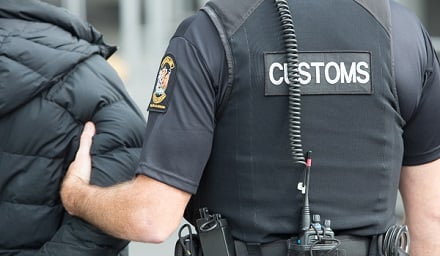
The stolen taonga symbolises the soldiers of A Company, nicknamed ‘Gum Diggers’.
Photo: Waitangi National Trust / supplied
A precious taonga stolen from a museum dedicated to the memory of the legendary 28th Māori Battalion has been recovered, five days after the brazen theft sparked outrage among the soldiers’ descendants.
The large piece of polished kauri gum, a symbol of the ‘Gum Diggers’ of the Battalion’s A Company, formed part of a font in Te Rau Aroha at the Waitangi Treaty Grounds.
Te Rau Aroha, or the Museum of the Price of Citizenship, is dedicated to all Māori who fought for New Zealand, but especially members of the 28th Māori Battalion.
Waitangi National Trust chairman Pita Tipene said visitors to the museum’s memorial gallery were encouraged to touch the kauri gum, which had water flowing gently over it, for the purpose of whakanoa, a cleansing ritual to remove tapu.
The theft of the taonga last Sunday had caused outrage and grief among descendants of A Company especially, but also other battalions around the country.
“It’s a desecration of something that symbolises the sacrifice and service of those who went to defend this country and put their lives on the line… To have the very symbol of A Company stolen, brazenly, from a museum constructed to highlight that service and sacrifice, really outraged people. There was a lot of anger around as our people found out about it.”
Tipene made a public appeal for the return of the taonga, and by Friday afternoon it seemed his call had been heard.
He was discussing the theft at a Waitangi National Trust meeting when the museum’s curator walked in with a bag, apparently the same one used to steal the kauri gum.
“She said, ‘I am absolutely relieved to tell you it has been returned.’ So I went and looked in the bag with my own eyes, I put my hands around it, I was so relieved to see it wasn’t damaged. A huge sigh of relief on my part, and also from a whole lot of other people who have a great deal of love and devotion to what it represents.”

A navy sailor reads the names adorning the walls of the memorial gallery at Te Rau Aroha, the Museum of the Price of Citizenship.
Photo: Peter de Graaf / RNZ
Tipene said the circumstances behind the taonga’s return were not yet clear.
The museum’s curator noticed the gum was missing last Sunday. When she went through CCTV footage, she saw it had been taken by a couple with a young child.
“They were really intentional. They knew exactly what they wanted, they didn’t look at anything else. They went directly to the gum and took it.”
The trust would review its security measures to ensure it could be kept safe in future.
“Unfortunately it’s the action of a very small minority that spoil things for the majority. We want it to remain there as a symbol, and so it can be used in a whakanoa way for those who have gone into the gallery and felt the spirit of their ancestors. It’s an act of cleansing.”
Tipene said he was thankful to the trustees of the Te Ahu Museum in Kaitāia who gifted the gum for Te Rau Aroha’s opening in 2020.
When Te Ahu’s trustees learned the piece had been stolen, they had offered to gift another. Various people and organisations had also offered to donate money for a replacement.
“We’re grateful that a whole lot of people have shown a great deal of benevolence towards this symbol and what it represents,” Tipene said.

Soldiers’ names adorn the walls of the memorial gallery at Te Rau Aroha, the Museum of the Price of Citizenship.
Photo: Peter de Graaf / RNZ
Senior Sergeant Peter Robinson of Mid North Police said staff located a “vehicle of interest” after searching many hours of CCTV footage.
Thanks to a member of the public, the kauri gum was returned to the museum, undamaged, on Friday.
Police had not yet been able to speak to them, and would like to do so as part of their investigation.
Enquiries were continuing and so far no arrests had been made.
Anyone with footage or information that could help was urged to call the police number 105, quoting file number 231121/3648.
Soldiers of the 28th Māori Battalion’s A Company, most of whom were Ngāpuhi from Northland, were affectionately known as ‘the Gum Diggers’.
Gum digging was a major industry in the 19th and early 20th century Northland with the resin from ancient kauri trees in demand for a wide range of decorative and industrial purposes. Nowadays large pieces can fetch several thousand dollars.




